Search the Special Collections and Archives Portal
Search Results
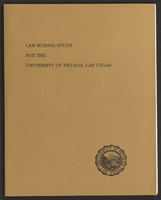
Law School Study for the University of Nevada, Las Vegas (bound)
Date
Archival Collection
Description
A bound version of the "Law School Study for the University of Nevada, Las Vegas" by Dean Willard H. Pedrick, College of Law, Arizona State University, and Professor Lorne Seidman, Chairman, Department of Finance, College of Business and Economics, University of Nevada, Las Vegas. From the University of Nevada, Las Vegas William S. Boyd School of Law Records (UA-00048).
Text

Charles Scott Emerson oral history interview: transcript
Date
Archival Collection
Description
Oral history interview with Charles Scott Emerson conducted by Claytee D. White on December 21, 2017 for the Remembering 1 October Oral History Project. In this interview, Charles Scott Emerson discusses his work with the American Red Cross and the disaster relief the organization provided during the aftermath of the October 2017 mass shooting in Las Vegas, Nevada. The interview begins with a discussion on Emerson's early life and career in Missouri and how he moved to Las Vegas in 2004. Emerson talks about the American Red Cross response plans and coordinated operations that are in place for when the community is faced with a disaster, going into specific detail on the community-wide response to the October 1, 2017 shooting. He gives a behind-the-scenes glimpse into how relief work is organized, using this interview as a chance to praise the hidden heroes of the October 2017 tragedy, including the people at the Family Assistance Center, the Attorney General's Office, the Driver's License Bureau, and the Coroner's Office, as well as mental health providers, child care workers, blood donors, and more. Throughout the interview, Emerson puts special emphasis on the importance of community in order to offer support in the aftermath of a tragedy as well as to prevent a man-made tragedy from occurring again.
Text
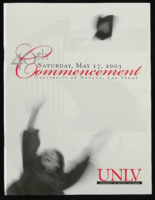
University of Nevada, Las Vegas (UNLV) 40th commencement program
Date
Archival Collection
Description
Commencement program from University of Nevada, Las Vegas Commencement Programs and Graduation Lists (UA-00115).
Text
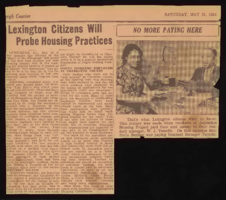
Housing Authority of Williamson, West Virginia: scrapbook, work notes, correspondence, and newspaper clippings
Date
Archival Collection
Description
Folder of materials from the Mabel Hoggard Papers (MS-00565) -- Civic engagement file. Includes a scrapbook, work notes, correspondence, and newspaper clippings related to Mabel Hoggard's employment at the Housing Authority of Williamson, West Virginia.
Mixed Content
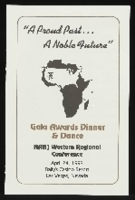
NABJ Western Regional Conference and Jackson State University National Alumni Association Conference: programs
Date
Archival Collection
Description
Programs for events that featured Roosevelt Fitzgerald as a speaker: National Association of Black Journalists Western Regional Conference Gala Awards Dinner and Dance (1993), and Fifth Biennial Farwestern Regional Conference and First National Conference of the Jackson State University National Alumni Association (1988). From the Roosevelt Fitzgerald Professional Papers (MS-01082) -- Personal and professional papers file.
Text
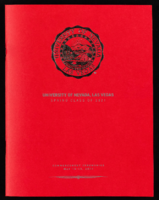
University of Nevada, Las Vegas (UNLV) Spring 2021 commencement program
Date
Archival Collection
Description
Commencement program from University of Nevada, Las Vegas Commencement Programs and Graduation Lists (UA-00115).
Text
Joyce Helens and Sonja Sibert (Great Basin College) oral history interview conducted by Magdalena Martinez and Elia Del Carmen Solano-Patricio: transcript
Date
Archival Collection
Description
From the Lincy Institute "Perspectives from the COVID-19 Pandemic" Oral History Project (MS-01178) -- Education sector interviews file.
Text

Sara Ortiz oral history interview: transcript
Date
Archival Collection
Description
Oral history interview with Sarah Ortiz conducted by Rodrigo Vazquez on December 20, 2019 for the Latinx Voices of Southern Nevada Oral History Project. In this interview, Ortiz discusses being born and raised in Austin, Texas and spending the majority of her life there before attending the Columbia Publishing Course in Manhattan, New York. Ortiz describes her family's many moves throughout the city of Austin and the changes that have since happened in the city. Ortiz recounts her trajectory in the publishing industry, which led her from Manhattan back to Austin, and eventually to Las Vegas, Nevada. Ortiz is currently the program and festival director for The Believer magazine and the Black Mountain Institute. She writes about what she and her colleagues hope to achieve with the magazine and annual festival, and about the changes that she hopes to see for Las Vegas' publishing and literacy industry.
Text

Chet Buchanan oral history interview: transcript
Date
Archival Collection
Description
Oral history interview with Chet Buchanan conducted by Barbara Tabach on November 28, 2017 for the Remembering 1 October Oral History Project. Chet Buchanan begins this interview with a discussion of his move to Las Vegas, Nevada in 1999 after he was offered a job as a radio show host for 98.5 KLUC. He talks about the specifics of his job, including his career background as well as the Chet Buchanan Toy Drive. For this interview, he specifically goes into detail on his coverage of the Las Vegas October 2017 mass shooting and discusses being in San Diego, California at the time, yet still striving to reach people through his broadcast with the help of CBS San Diego. Throughout the interview, Buchanan examines his desire to make a difference in the community with his show and his interactions with the public.
Text
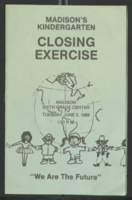
Mabel Hoggard: community interest materials (folder 2 of 3)
Date
Archival Collection
Description
Folder of materials from the Mabel Hoggard Papers (MS-00565) -- Personal papers file. This folder contains event programs, "Going For The Gold: The Story of Black Women in Sports" booklet by Ken Bently (a gift to J. David & Mabel W. Hoggard, not digitized in its entirety), "Pictorial Souvenir Book of the Pennsylvania State Federation of Women's Clubs, Inc." (not digitized in its entirety), and Alpha Kappa Alpha Sorority Theta Theta Omega Chapter 1988 "BLAC-tivities" calendar.
Mixed Content
